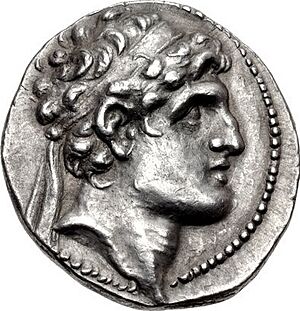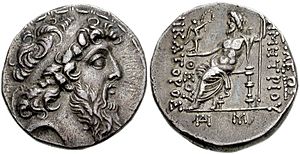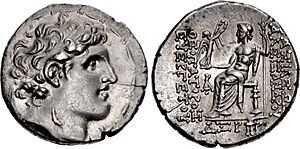Alexander Balas facts for kids
Quick facts for kids Alexander I Balas |
|
|---|---|

Coin of Alexander I Balas, Antioch mint
|
|
| Basileus of the Seleucid Empire (King of Syria) | |
| Reign | 150 BC – August 145 BC |
| Predecessor | Demetrius I Soter |
| Successors | Demetrius II Nicator or Antiochus VI Dionysus |
| Born | Smyrna (now İzmir, Turkey) |
| Died | August 145 BC |
| Spouse | Cleopatra Thea |
| Issue | Antiochus VI Dionysus (first son with Cleopatra Thea) |
| Dynasty | Seleucid |
| Father | Antiochus IV Epiphanes (unconfirmed) |
| Mother | Laodice IV (unconfirmed) |
Alexander I Balas was a ruler of the Seleucid Empire from 150 BC to 145 BC. He claimed to be the son of a former king, Antiochus IV Epiphanes. With help from the Kingdom of Pergamon, Alexander started a civil war against the current Seleucid King, Demetrius I Soter.
Alexander won the war and became king in 150 BC. He then married Cleopatra Thea, a princess from the nearby Ptolemaic kingdom of Egypt. During his rule, the Seleucid Empire began to lose control of its eastern lands. In 147 BC, Demetrius II Nicator, the son of the king Alexander had overthrown, began a new war. Alexander's ally, King Ptolemy VI Philometor of Egypt, first supported him but then switched sides. Alexander was defeated in battle and died shortly after.
Contents
About Alexander Balas
His Early Life and Claim to the Throne
Alexander Balas said he was the son of King Antiochus IV Epiphanes and Queen Laodice IV. This would have made him the rightful heir to the Seleucid throne. However, some ancient writers like Polybius and Diodorus believed this claim was false. They wrote that Alexander and his sister were actually from Smyrna and had humble beginnings. Modern historians still debate whether his claim was true or if it was a story created by his supporters.
Alexander was first put forward as a possible king by Attalus II, the ruler of Pergamum. Attalus was worried about King Demetrius I's actions in other kingdoms. Alexander and his sister were helped by Heracleides, a former minister. In 153 BC, Heracleides took Alexander to Rome. The Roman Senate recognized Alexander as the rightful Seleucid king and agreed to support him.
The War for the Throne
After gathering soldiers, Alexander and Heracleides sailed to Phoenicia. They captured Ptolemais Akko and other important cities like Tyre. Alexander's coins from this time showed his connection to Antiochus IV. He also used the title Theopator, meaning 'Divinely Fathered'. His coins also made him look like Alexander the Great, showing his military strength.
Alexander and Demetrius I both tried to get the support of Jonathan Apphus, a leader in Judaea. Alexander won Jonathan over by giving him an important position and making him the high priest in Jerusalem. With Jonathan's experienced soldiers, Alexander fought a major battle against Demetrius in July 150 BC. Demetrius was killed in this battle. By the autumn, Alexander was recognized as king across the entire Seleucid Empire.
Alexander's Time as King
His Rule and Marriage
Alexander took control of Antioch, a major city. His chief minister, Ammonius, removed many of Demetrius I's supporters. To strengthen his power, Alexander formed an alliance with Ptolemy VI Philometor, the king of Egypt. This alliance was sealed when Alexander married Ptolemy's daughter, Cleopatra Thea. The wedding was a grand event in Ptolemais, with King Ptolemy VI and Jonathan Apphus attending.
Alexander honored Jonathan greatly, treating him as his main representative in Judaea. Special coins were made to celebrate the royal wedding. These coins showed Alexander and Cleopatra Thea together. Some historians believe these coins suggest that Cleopatra had a lot of influence over Alexander. Others think it just showed how important the alliance was.
Losing Eastern Lands
While Alexander was king, the Seleucid Empire began to lose its eastern territories. The Parthians, led by Mithridates I, took advantage of the empire's problems. They invaded and took control of Media by 148 BC. Other regions also declared independence but were soon taken over by the Parthians. By 147 BC, the Parthians were close to Babylonia, one of the Seleucid Empire's main areas.
Alexander did not do much to stop these losses in the East. Some ancient writers who were against him said he was too busy enjoying himself to deal with the Parthians. They claimed he left the administration to two commanders who only cared about themselves. While this might be partly propaganda, it is true that the Seleucid Empire became weaker under Alexander.
War with Demetrius II and Death

In 147 BC, Demetrius I's son, Demetrius II, returned to Syria with an army. He quickly gained control of many areas. Alexander Balas was busy dealing with a revolt in another region at the time. In 145 BC, King Ptolemy VI of Egypt invaded Syria. He said he was supporting Alexander Balas, but he took control of many coastal cities.
While in Ptolemais Akko, Ptolemy suddenly changed sides. According to Josephus, Ptolemy found out that Alexander's minister, Ammonius, was planning to kill him. When Alexander refused to punish Ammonius, Ptolemy decided to support Demetrius II instead. Ptolemy then married his daughter Cleopatra Thea to Demetrius II.
Alexander returned with his army, but Ptolemy VI and Demetrius II defeated his forces in a battle. Alexander fled to Arabia to join an Arabian leader named Zabdiel Diocles. However, Alexander was killed there. Sources disagree on who killed him; it might have been his own generals or Zabdiel himself. Ptolemy VI also died shortly after from injuries he got in the battle.
Zabdiel continued to care for Alexander's young son, Antiochus VI Dionysus. Later, in 145 BC, a general named Diodotus made Antiochus king to lead a rebellion against Demetrius II. Years later, another person named Alexander Zabinas also claimed to be Alexander Balas's son, but this was probably not true.
See also
- List of Syrian monarchs
- Timeline of Syrian history
- Diophantus of Abae
 | Ernest Everett Just |
 | Mary Jackson |
 | Emmett Chappelle |
 | Marie Maynard Daly |


